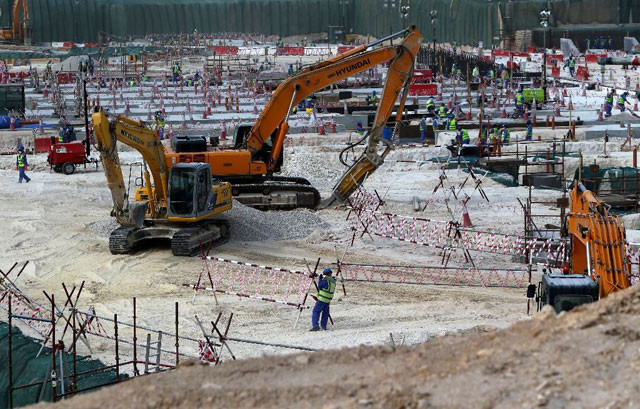Qatar vows '100% compliance' on key labour reform
Government figures show around 85 percent of Qatar's 2.1 million workforce are now paid electronically

Qatar said it expects "100 percent compliance" from businesses by the end of 2016 on a labour reform introduced to ensure the country's vast migrant workforce receive their salaries on time.
Government figures released in Doha on Wednesday to mark the one-year anniversary of the introduction of the Wage Protection System (WPS) show that 1.8 million -- around 85 percent -- of Qatar's 2.1 million workforce are now paid electronically.
Pakistani worker ‘commits suicide’ in Saudi Arabia
That works out at around 37,000 companies. But a senior labour ministry official told AFP that all companies will sign up to the scheme by the end of December.
"Our aim is to have 100 percent compliance by the end of the year," said Mohammed Ali Al-Meer, the director of Qatar's labour inspection department. "We have a commitment from the (remaining) 15 percent, we have contacted them."
The WPS was introduced on November 2 last year by the 2022 football World Cup host in an attempt to improve labour conditions following widespread international criticism of Qatar's treatment of migrant workers.
Failure to pay salaries on time, especially for low-waged blue collar workers, was one of the biggest complaints voiced by rights groups against companies in the energy-rich Gulf state.
Hand in hand: Labourers take to streets against precarious work
A 2013 academic study, "Portrait of Low-Income Migrants in Contemporary Qatar," found that around a fifth of migrant workers were "sometimes, rarely or never" paid on time.
Bosses of companies who do not pay staff on time face fines of up to 6,000 Qatari riyals ($1,650, 1,490 euros) for every worker who did not receive their salary, and up to one month in jail, under the WPS.
Labour officials said 385 violations had been recorded by companies still not paying workers on time in the past 12 months, though it was unclear whether any bosses had been imprisoned.
Along with the figures, a statement from labour minister Issa bin Saad Al-Jafali Al-Nuaimi on Wednesday said WPS had ensured "greater protections for workers".
The reform has been largely welcomed by critics, but there have been complaints that the government dragged its heels in introducing the system -- it was initially delayed for several months -- and has not been strong enough in enforcing compliance, a charge denied by Doha.
Hand in hand: Labourers take to streets against precarious work
"The ministry is tough enough dealing with companies that don't comply with the WPS system," insisted Meer.
Despite this, problems still exist.
In September it was reported that as many as 400 migrant staff working for an electrical company in Qatar had gone unpaid for up to four months.
Mustafa Qadri, a specialist researcher with human rights consultancy group Equidem, said the WPS had "shown the way forward" but further labour reform was needed.
"Most migrant workers continue to pay large recruitment fees to come to Qatar that leave them heavily indebted," he said.
"They still require their sponsor's permission to change jobs or leave the country. And, critically, Qatar's labour system still struggles to ensure companies respect minimum labour standards."





1733130350-0/Untitled-design-(76)1733130350-0-208x130.webp)











COMMENTS
Comments are moderated and generally will be posted if they are on-topic and not abusive.
For more information, please see our Comments FAQ